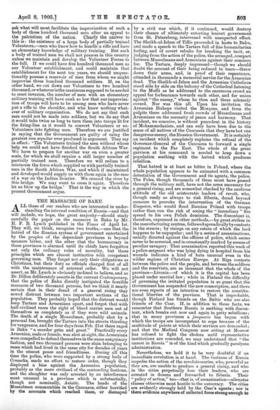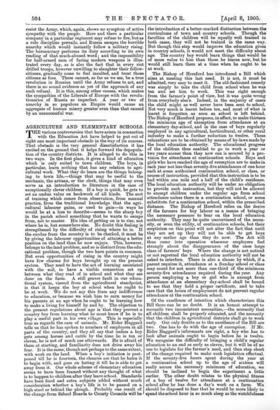THE MASSACRE OF BAKU. A LL those of our readers who
are interested in under- standing the internal condition of Russia—and that will include, we hope, the great majority—should study carefully the paper on the massacre in Baku by Mr. H. F. B. Lynch published in the Times of April 1st. They will, we think, recognise two truths,—one that the hatred of the Russian system of government entertained by the peoples of the dependent provinces is beyond measure bitter, and the other that the bureaucracy in those provinces is alarmed until its chiefs have forgotten not only the ordinary rules of morality, but those principles which are almost instinctive with competent governing men. They forget not only their obligations as Christians, but their duty as officials charged first of all with the maintenance of external order. We will not assert, as Mr. Lynch is obviously inclined to believe, and as Dr. Dillon deliberately asserts in the current Contemporary, that the police of Baku directly instigated the horrible massacre of two thousand persons, but we think it nearly certain that in their dread of a general rising they sowed distrust between two important sections of the population. They probably hoped that the distrust would keep Tartars and Armenians apart, and forgot that with half-civilised races the sight of blood carries men out of themselves as completely as if they were wild animals. The death of a single Mussulman, probably shot by a personal foe, brought the Tartars into the streets thirsting for vengeance, and for four days from Feb. 21st there raged in Baku "a murder grim and great." Practically every Armenian, male or female, was shot at sight, the Armenians were compelled to defend themselves in the same sanguinary fashion, and two thousand persons were slain belonging to races which had lived in the same city for decades of years in the utmost peace and friendliness. During all this time the police, who were supported by a strong body of Cossacks, made no effort to restore order, though they displayed a bias against the Armenian population, probably as the more civilised of the contending factions, and the slaughter was only arrested by an interference most unusual in a province which is substantially, though not nominally, Asiatic. The heads of the Mussulman communities in the Caucasus, either horrified by the accounts which reached them, or dismayed by a civil war which, if it continued, would destroy their chance of ultimately extorting lenient government from St. Petersburg, intervened with unexpected effect. The Sheikh-ul-Islam of Tiflis proceeded in haste to Baku, and made a speech to the Tartars full of fine humanitarian feeling, and of covert rebuke for breaking the tacit, or, judging from the action of the police, the arranged, compact between Mussulmans and Armenians against their common foe. The Tartars, deeply impressed—though we should doubt the account of their being reduced to tears—threw down their arms, and, in proof of their repentance, attended in thousands a memorial service for the Armenian dead. The Sheikh-ul-Islam and the Armenian Catholicos stood side by side on the balcony of the Cathedral listening to the Mufti as he addressed to the enormous crowd an appeal for forbearance towards each other, and for union against "the enemy," whom he then and there solemnly cursed. Nor was this all. Upon his invitation the Armenian Bishops visited the Mosques, and from the pulpits there addressed fresh crowds of Mussulmans and Armenians on the necessity of peace and. harmony. That incident, we conceive, is without precedent in the history of Mohammedanism, and can only have been due to the sense of all natives of the Caucasus that they have but one dangerous enemy, the Russian Government. It is certainly an incident which completely explains the refusal of the Governor-General of the Caucasus to forward a single regiment to the Far East. The whole of the great garrison at his command is needed to keep down a population seething with the hatred which produces rebellion.
That hatred is at least as bitter in Poland, where the whole population appears to be animated. with a common detestation of the Government and its agents, the police. The Poles, though thousands of them must have passed through the military mill, have not the arms necessary for a general rising, and are somewhat checked by the cautious attitude of the old aristocratic leaders of revolt, who, though ready as always to risk Siberia, dread beyond measure to provoke the intervention of the German Emperor, who would flood Russian Poland with troops rather than run the risk of seeing the " incendiary" fire spread to his own Polish dominion. The discontent is, therefore, expressed in other methods,—by great strikes in the manufacturing centres, followed sporadically by contests in the streets ; by risings on any estate of which the lord happens to be unpopular; and by a series of assassinations, usually directed against the officers of police, which seems never to be arrested, and is occasionally marked by scenes of peculiar savagery. That assassination reported this week of a police-sergeant who was lying dying in hospital from his wounds indicates a kind of hate unusual even in the wilder regions of Christian Europe. At Riga contests between the police and the people, and between the soldiers and the reservists, are so incessant that the whole of the province—Livonia—of which it is the capital has been placed under martial law ; while in Finland the difficulty of governing the irritated population is so great that the Government has suspended the new conscription, and there are even reports of an intention to restore the constitu- tional liberties of the province. That is improbable, though Finland has friends on the Baltic who are also friends of the Czar. If, in addition to these facts, we remember that Southern Russia is seething with discon- tent, which breaks out now and again in petty rebellions ; that in many provinces a jacquerie has begun with which the troops are incompetent to cope because of the multitude of points at which their services are demanded ; and that the Medical Congress now sitting at Moscow has refused to fight the cholera until representative institutions are conceded, we may understand that "the unrest in Russia" is of the kind which gradually paralyses administration.
Nevertheless, we hold it to be very doubtful if an immediate revolution is at hand. " The vastness of Russia impedes the action of the revolutionaries, who, powerful as they are, are unable to produce a general rising, and who in the cities perpetually lose their leaders, who are arrested in dozens and forwarded to Siberia. Their "policy of action," too—that is, of assassination—alienates classes otherwise most hostile to the autocracy. The cities are evidently strongly held by the Czar's agents ; nor is there evidence anywhere of collected force strong enough to resist the Army, which, again, shows no symptom of active sympathy with the people. Here and. there a particular company in a particular regiment may refuse to fire, but as a rule discipline prevails, and Russia escapes the horrible anarchy which would instantly follow, a military rising. The bureaucracy performs its duty according to its own reading of that much-abused word; and the impossibility for half-armed men of facing modern weapons is illus- trated every day, as is also the fact that in every riot drilled troops, however unwilling to slaughter their fellow- citizens, gradually come to feel insulted, and treat those citizens as foes. There cannot, so far as we see, be a true revolution in Russian until the Army refuses to act, and there is no sound evidence as yet of the approach of any such refusal. It is this, among other causes, which makes the sympathies of the Liberals of Europe with the revolu- tionaries of Russia so imperfect. A year or two of anarchy in so populous an Empire would. cause an aggregate of human misery greater even than that caused by an unsuccessful war.











































 Previous page
Previous page